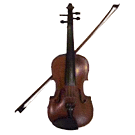

 |
The part modification dialog allows you to perform automated part-wise modifications that would otherwise consume lots of time.

Transposition:
When writing music for transposing instruments like trumpet, saxophone,
alto recorders etc., it is often essential to alter transposition such way that the part for the transposing
instrument is written at the right height, the right clef,
and the right number of accidentals. The transpositions listed here will
do for most purposes.
C to Bb (Sounding -> [Bb-Clarinet,
Tuba, Trumpet, Soprano Saxophone
etc.])
C to A (Sounding -> [A-Clarinet])
C to Eb (Sounding -> [Eb-Clarinet, Alto Saxophone,
Baritone-Saxophone etc.])
C to F (Sounding -> [Alto-recorder])
Bb to C ([Bb-Clarinet, Tuba, Trumpet, Soprano Saxophone]
-> Sounding )
Bb to Eb ([Bb-Clarinet, Tuba, Trumpet, Soprano Saxophone]
-> [Alto-Saxophone] )
Bb to A ([Bb-Clarinet, Tuba, Trumpet, Soprano Saxophone]
-> [A-Clarinet] )
Eb to C ([Alto-Saxophone] -> Sounding )
Eb to Bb ([Alto-Saxophone] -> [Bb-Clarinet, Tuba,
Trumpet, Soprano Saxophone] )
A to C ([A-Clarinet] -> Sounding )
A to Bb ([A-Clarinet] -> [Bb-Clarinet, Tuba, Trumpet,
Soprano Saxophone] )
F to C ([Alto-recorder] -> Sounding)
Sounding implicates non-transposing instruments like piano, flute,
oboe, violin etc
Octavation:
If you want your piece of music one or two octaves up or down this is the place to look.
Duration modifications:
Sometimes you find yourself having a piece of music that doesn't look nice in the used meter (lots of
1/32 notes for instance). By doubling or halving the meter (and the note durations accordingly) you can
suit the notation to your needs.
Clef changes:
If you are rewriting music for another clef it it will often be necessary to change pitch as well in order to keep the notes within reach of the usual staff range.
Treble to Bass (Violin -> Violoncello)
Treble to Alto clef
Alto to Treble clef
Bass to Treble (Violoncello -> Violin)
Bass to Tenor clef
Tenor to Bass
Deletion:
Once in a while you'd like to get rid of text, whitespace,
hard bar lines or whatever. You can of course look for all the offending objects
and delete then one by one on the working-area. However, a much more efficient
way is to use one of the delete functions provided here.
Delete enharmonization,shifts, manual
clustering, ties, combi-notes, grace-notes, whitespace,
hard pages or bar lines, lyrics, info-text, dynamic symbols,
chord symbols, tempo changes, color changes
Other:
When you create an automatic bass-part and are going to modify that part, you might want to get rid of the abundance of rests. Rest reducing is the solution.


